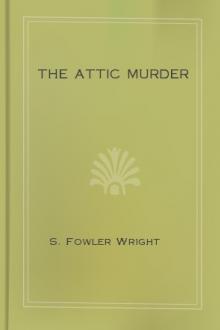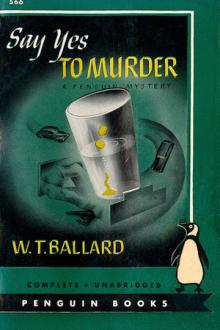The Attic Murder by S. Fowler Wright (read me like a book txt) 📕

- Author: S. Fowler Wright
- Performer: -
Book online «The Attic Murder by S. Fowler Wright (read me like a book txt) 📕». Author S. Fowler Wright
The Attic Murder
by Sydney Fowler
I’M afraid I can’t give you references. I’m a stranger to London. Perhaps I’d better pay a week in advance?” His hand went boldly to his empty pocket. It was time he wanted — time at whatever cost. He could hear the police-whistles outside.
The old woman looked at him doubtfully. She had asked forty-five shillings, and would have taken half the amount.
“Have you got any luggage, Mr. —” she began.
“Edwards,” he answered. “Henry Edwards… Yes. I shall bring my luggage this evening. Perhaps you could let me have some tea now, and a wash?”
He did not develop his proposal to pay in advance, and the old woman did not press it. He had a face and manner that inspired confidence. Had not Counsel for the Crown turned even this circumstance against him, and had not the soft-tongued Judge, with his tone of measured impartiality, supported the argument with a deadlier ingenuity? “You may regard the younger prisoner,” he had said, “as having been under the influence of his more hardened companion. The impression which he will have made upon you while in the witness-box may not have been entirely unfavourable, even though, as men of the world — as men of common sense — you may observe the improbabilities of the tale he told you. But, if you are satisfied of his guilt, you must not allow such an impression to deflect your judgement, nor to cause you to forget the oaths you have taken. It is inevitable that men engaged in such crimes as that of which the prisoners are accused should be of sufficient address and plausibility to draw their intended victims into their clutches. The question of the prisoners’ previous records (so far as they can be properly weighed against this class of criminality) will receive due and separate considerations, should you decide that their guilt is proved.”
He had gone on to impress the jury with the gravity of the crime of which the confidence trickster is guilty, its increasing prevalence, and the reluctance of its victims to prosecute. All of which was true enough, but utterly irrelevant to the question of his guilt or innocence, and could only dispose the jury to convict him without too scrupulous weighing of the defence he had offered.
After hearing the summing-up, he had had no doubt of what that verdict would be. His most active resentment had been against the tone in which he had been told to stand up to hear the judgement delivered. Tony Welch had had five years. Well, he supposed he deserved it. And for him there had been fifteen months in the second division.
Before that, he had been asked whether he had any reason to offer why sentence should not be passed upon him. He knew that it was nothing more than a mockery of formula, but he had looked at the jury as he answered: “It only shows how useless it is to tell the truth,” and he had seen one of them drop his eyes uncomfortably.
That had been an hour ago. Barely that. And then he had been hurried from the dock, and there had been a moment’s confusion when the Inspector had knocked over the carafe in the room below, and — he had walked out. It had been as simple as that.
It must have been observed in five seconds, and his liberty would have been of the briefest, had he not noticed the street door standing unlatched, and the card APARTMENTS in the window, as he had turned the corner at a quick walk, which did not dare to seem hurried — and, at the moment’s impulse, he had stepped inside and closed it.
No one had noticed. The street had been too full, and too busy.
He had stood in the little hall, after closing the door, and knocked on the table there, till the landlady had come up from the basement. “I couldn’t make your bell ring, and the door was open,” he had said pleasantly, and she had accepted his explanation without suspicion.
Half an hour later, he sat eating a stale egg, and drinking some ill-brewed tea, while he reviewed his position.
After all, it was largely his own fault, even apart from the impulsive folly which had involved him with August Garten, and made him so maddeningly easy a catspaw in a game which he did not guess. He could, perhaps, have defended himself more easily had he given his own name, and enabled the police to establish an identity which would have made it at least improbable that he had been more than a recent and casual acquaintance of the major criminal. But the thought of Marian! His sister-in-law’s outraged respectability, and his brother’s jeers — no, he had been right to conceal it, at whatever cost.
But, that having been so, why should he not now go boldly back to his own identity? He considered the possibility only to discard it. There was the time of his absence, which would coincide so exactly with that during which he had been awaiting trial — above all, there were the fingerprints. What a fool he had been to allow them to be taken! But it had been done so suavely, and it was true that its first result had been to show that he was innocent of any previous charge.
It had seemed best not to object at the time — and now he had rendered his identification absolute and undeniable so long as his life should last, unless his hands should be lopped away. It was as though he walked the world with an indelible brand… And he would always be a convicted criminal: always liable to be arrested and subjected to the unserved sentence: always liable to the blackmailing activities of any who should discover his identity.
Was there no way out? There were three, two of which he was unwilling to face, and the third was a forlorn hope at the best.
There was suicide. Always that. But to those who are young and healthy of mind it is a way that does not appeal: to those who have courage it is the way of cowardice and shame. He dismissed it at once. A theoretical road of escape, but one which he knew he would never take.
There was the way of submission. He might surrender himself to the blind omnipotence of the law, serve the sentence imposed, and return to his own identity with some invented excuse for his silent absence; and with at least something less to fear from exposure or blackmail than must be his lot while he continued to evade the penalty his conviction brought.
But he saw this also as an impossible choice. If he should be recaptured, he must submit to a power against which he had no strength to contend; but to do so by his own choice was beyond any resolution that he possessed. He had experienced too much already of the physical indignities, the degradations of enforced routines, which have substituted a spiritual persecution for the cruelties of neglect and dirt which were the prison horrors of a previous century. Beyond that, he had a natural, if somewhat illogical feeling that to make such a surrender would be to accept the judgement of the court, as though he himself admitted guilt, and accepted the sentence which an impartial justice had imposed upon him.
The third road of escape was of a less sinister but more difficult character. He must obtain such evidence as would demonstrate his own innocence, and enable him to gain remission of the penalty. He knew too little of law to understand what obstacles of procedure there might be for one in such a position, already condemned, and avoiding the infliction of the allotted punishment; nor did his mind go so far ahead as to concern itself with such possibilities. The first part of such a programme presented sufficient difficulties for immediate consideration.
And — more urgent still — if he were to endeavour to obtain evidence that he were not the accomplice of organized fraud which twelve of his fellow citizens had declared him to be, he must consider how his immediate necessities could be supplied, and either this or another hiding-place be rendered permanently secure.
For the short moment he might be safe. Probably no one had seen him enter the house; and its proximity to the court would make it an unlikely place for the police to suspect. But there was no lasting comfort in this, when he considered the emptiness of his pockets, and that the luggage of which he had spoken would not arrive.
He had a well-founded fear that the police, being human, would give an amount of attention to such an escape disproportionate to any importance it might have to impartial eyes. It was certain that the assistance of the press would be invoked: that his description would be promptly circulated with the full and accurate details that the police cords would supply.
He had, of course, worn his own clothes in the dock. He was not embarrassed by prison garb. But there was little comfort in that while they could describe not only his appearance in every detail, but every garment that he had on. And he saw that, if he should go out after the next edition of evening papers had reached the street, not the police only, but every man he met would be his potential foe.
In imagination, he ran from pursuing crowds: he heard police whistles rousing those ahead to obstruct his way: he jumped walls: he trod deeply in garden dirt: he was horribly cornered in cul-de-sacs: he crouched in corners, hearing voices that became louder with the sound of approaching feet.
And to avoid such ends he must think — think and plan — in the short hours of security that were his, while the search spread past him, and outward on every side. As he got up from the table, and moved to a fireside chair, leaving a well-cleared tray — for what certainty was there as to where or when his next meal would be? — he even had a faint transient smile for that abortive search on which he rightly guessed that so much energy was being wasted, while he had been taking a quiet meal almost within sight of the door out of which he walked.
AS Francis Hammerton reflected thus, Mrs. Benson came in to clear.
He knew her name already from inspection of a business card that occupied a prominent position among the heterogeneous mantelpiece ornaments, and as he now parried questions to which accurate replies would have been of too startling a character, and assured himself with some difficulty that they were prompted by nothing more than a natural curiosity, he looked, with concealed anxiety, at the woman who might hold his fate in her hands in the next hour.
He supposed that she would be likely to indulge herself with an evening paper. It was less probable that she would go out to buy it. It would be pushed under her door. That might be any time now. Or she might prefer to have the final edition, two — even three hours later than this.
If she should have it earlier, it might not be read till she had





Comments (0)